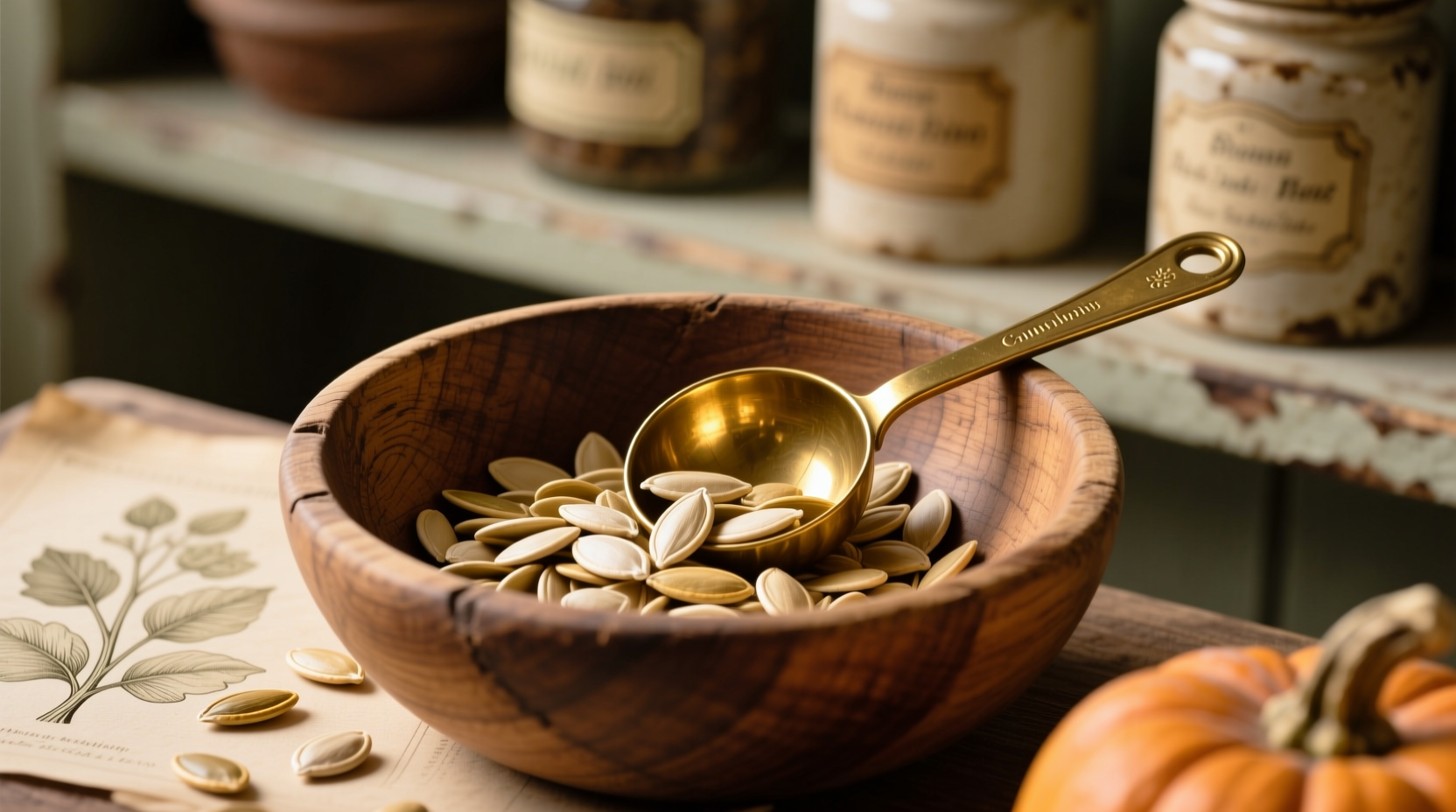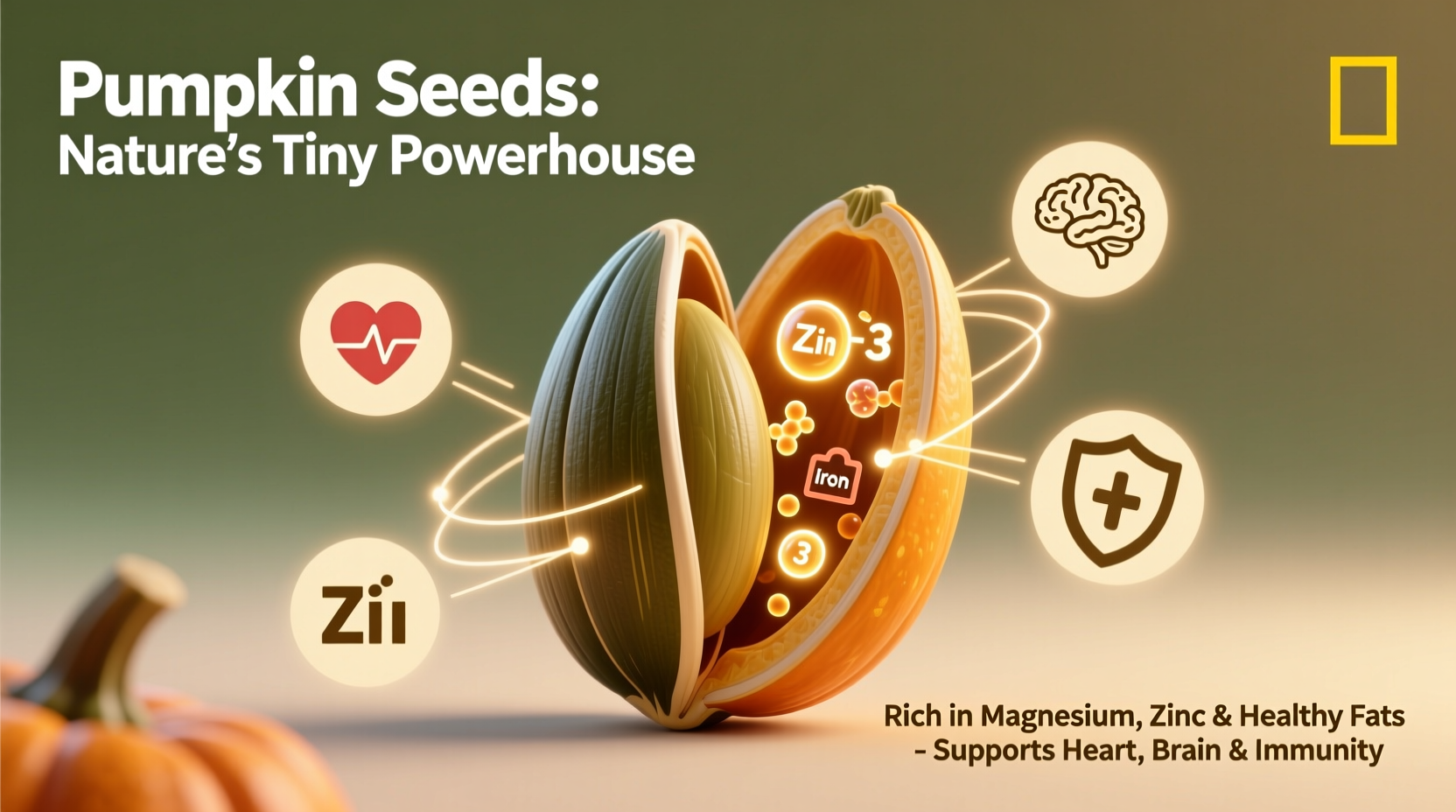Often overlooked as mere Halloween byproducts, pumpkin seeds (pepitas) have been valued for their nutritional properties since ancient Mesoamerican civilizations. Modern science confirms what traditional cultures knew - these small green powerhouses offer remarkable health benefits backed by clinical research. Let's explore exactly what pumpkin seeds are good for and how to maximize their benefits.
What Pumpkin Seeds Are Good For: The Science-Backed Benefits
Heart Health Protection
Pumpkin seeds contain substantial amounts of magnesium (151mg per ounce), a mineral critical for cardiovascular function. According to research published in the American Journal of Clinical Nutrition, adequate magnesium intake correlates with lower risks of hypertension and cardiovascular disease. The seeds' unique combination of healthy fats, including alpha-linolenic acid (ALA), plus plant sterols work synergistically to maintain healthy cholesterol levels.
| Nutrient | Pumpkin Seeds (1oz) | Chia Seeds (1oz) | Sunflower Seeds (1oz) |
|---|---|---|---|
| Magnesium | 151mg (37% DV) | 95mg (23% DV) | 38mg (9% DV) |
| Zinc | 2.2mg (20% DV) | 1.0mg (9% DV) | 1.4mg (13% DV) |
| Fiber | 1.7g | 9.8g | 3.0g |
| Protein | 8.5g | 4.7g | 5.8g |
Prostate Health Support
For men's health, pumpkin seeds shine particularly bright. Their high zinc content (crucial for prostate function) and phytosterols have been studied for their protective effects. A 2014 study in Nutrition Research and Practice found that regular pumpkin seed consumption correlated with improved urinary symptoms in men with benign prostatic hyperplasia (BPH). Traditional European herbal medicine has utilized pumpkin seeds for urinary tract health for centuries, long before modern science validated these applications.
Sleep Quality Enhancement
Struggling with sleep? Pumpkin seeds contain tryptophan, magnesium, and zinc - all essential for melatonin production. Research from the European Neurology Journal demonstrated that magnesium deficiency correlates strongly with insomnia, particularly in older adults. Consuming pumpkin seeds 1-2 hours before bedtime provides these sleep-supporting nutrients in their most bioavailable form.

Blood Sugar Regulation
Multiple studies, including research published in Diabetes Care, show pumpkin seeds' positive impact on insulin regulation. Their high magnesium content improves insulin sensitivity, while their fiber and healthy fat content slow carbohydrate absorption. For individuals managing type 2 diabetes, incorporating pumpkin seeds into meals can help maintain more stable blood glucose levels throughout the day.
Practical Guide to Maximizing Pumpkin Seed Benefits
Optimal Consumption Methods
To unlock maximum nutritional value:
- Raw vs. Roasted: Light roasting (below 170°F/77°C) preserves nutrients better than high-heat methods
- Soaking: Soak seeds overnight to reduce phytic acid and improve mineral absorption
- Daily Amount: 1-2 tablespoons (15-30g) provides substantial benefits without excessive calories
When Benefits Apply (and Limitations)
While pumpkin seeds offer numerous health advantages, understanding their context boundaries ensures realistic expectations:
- Prostate benefits require consistent consumption over months, not immediate results
- Heart health improvements work best as part of comprehensive lifestyle changes
- Individual responses to blood sugar effects vary based on metabolic health
- Nutrient absorption improves when consumed with healthy fats (like avocado or olive oil)
Historical Timeline of Medicinal Use
Pumpkin seeds' therapeutic applications span centuries:
- 5500 BCE: Earliest archaeological evidence of pumpkin cultivation in Mexico
- 16th Century: Aztec medical texts document pumpkin seeds for urinary tract health
- 1800s: European herbalists adopt pumpkin seeds for parasite treatment
- 1979: First clinical study published on pumpkin seeds' effects on prostate health
- Present: Over 50 clinical studies investigating pumpkin seed health benefits
Important Considerations
While generally safe, keep these points in mind:
- High calorie density (180 calories per ounce) requires portion control for weight management
- Those on diuretic medications should consult doctors due to potassium content
- Raw seeds contain phytic acid which may interfere with mineral absorption for sensitive individuals
- Always choose organic, unsprayed seeds when possible to avoid pesticide residues
Integrating pumpkin seeds into your daily routine offers a simple, evidence-based approach to enhancing multiple aspects of health. Their versatility in cooking - from smoothie additions to salad toppings - makes reaping these benefits both delicious and convenient.
How many pumpkin seeds should I eat daily for health benefits?
A daily serving of 1-2 tablespoons (15-30g) provides optimal benefits without excessive calories. This amount delivers approximately 40% of your daily magnesium needs and 20% of zinc requirements while supporting heart health, sleep quality, and blood sugar regulation.
Are raw or roasted pumpkin seeds more nutritious?
Raw pumpkin seeds retain slightly more heat-sensitive nutrients, but light roasting (below 170°F/77°C) preserves most nutritional value while improving flavor and digestibility. Avoid high-temperature roasting which can damage healthy fats. Soaking raw seeds overnight reduces phytic acid and enhances mineral absorption.
Can pumpkin seeds help with sleep problems?
Yes, pumpkin seeds contain tryptophan, magnesium, and zinc - all essential for melatonin production and sleep regulation. Consuming 1-2 tablespoons 1-2 hours before bedtime provides these sleep-supporting nutrients in their most bioavailable form. Research shows magnesium deficiency correlates strongly with insomnia, particularly in older adults.
Do pumpkin seeds really support prostate health?
Clinical research supports pumpkin seeds' benefits for prostate health. Their high zinc content (crucial for prostate function) and phytosterols have been studied for protective effects. A 2014 study in Nutrition Research and Practice found regular consumption correlated with improved urinary symptoms in men with benign prostatic hyperplasia (BPH). Benefits typically require consistent consumption over several months.











 浙公网安备
33010002000092号
浙公网安备
33010002000092号 浙B2-20120091-4
浙B2-20120091-4